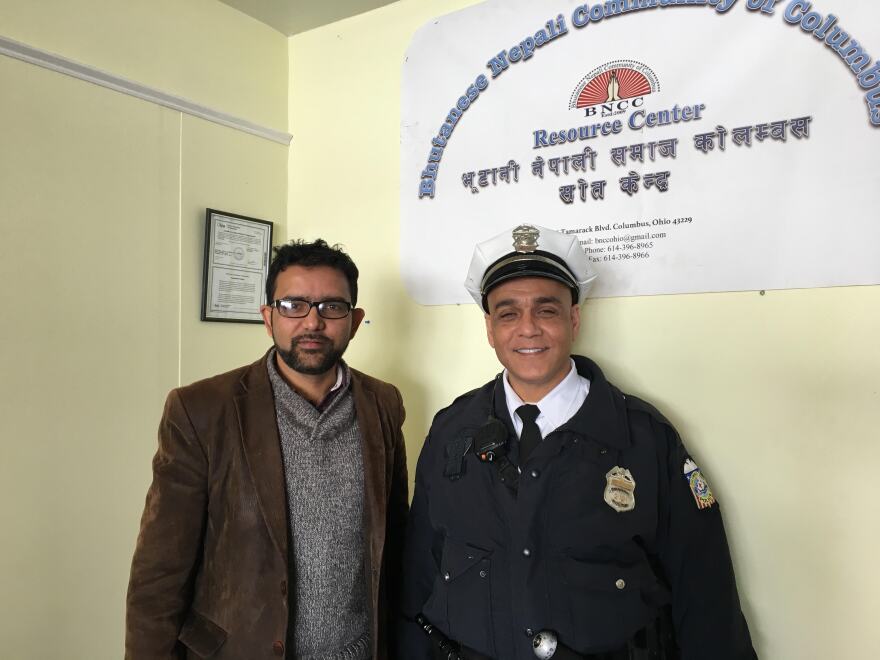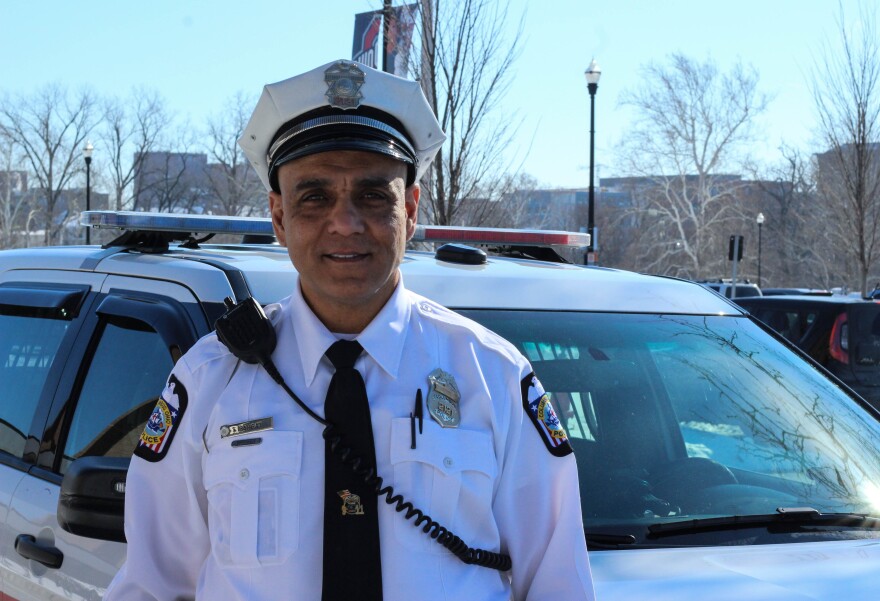On a Thursday morning, Officer Khaled Bahgat drives his police cruiser to the Northeast side of Columbus. There, in an aging apartment development, lives a significant concentration of Bhutanese-Nepali refugees.
The population has resided there for several years, after being relocated from Nepal to the United States beginning in 2008.
Typically, Officer Bahgat might be here to respond to a complaint or a 911 call. Today, he’s come to chat with the director of a local non-profit, the Bhutanese Nepali Community of Columbus.
Last November, when Mayor Andrew Ginther rolled out his public safety strategy, he included the curious role of a “Muslim Liaison” within the Columbus Police Department.
The title has since changed to "New American Diversity and Inclusion Liaison Officer." It’s a mouthful, Bahgat jokes, but he thought the role should focus on a broader population: those recently relocated to the U.S.
“When you have a lot of people who come from diverse communities and they move here and it's only been a few months or a few years, our expectations of them are a little too high,” Bahgat says.
Often, refugees and immigrates are given only a brief orientation on American laws and resources when they arrive. Navigating the complexities of the U.S. legal system may seem especially overwhelming, especially if someone’s arrived from a region where those services are corrupt or unreliable.
Bahgat has personal experience with that kind of a transition. Born in Egypt, he moved with his family to the States at the age of 15.
“If I had to take a guess, [it took me] 10 years to say, 'This is where I hang my hat,'" he says.
He's hoping that experience will help him connect with the many refugee and immigrant communities across the city. Only after conducting some online research did he realized the extent of the city’s foreign- born population.
“When I first printed off the website [on] the different cultures that are living here in the Franklin County area, I was like shocked," Bahgat says. "I was like 'wow!'"
In the last 10 years, Central Ohio has received some 16,000 refugees that are predominately from 10 countries. Researchers and members of these communities may argue that the actual numbers are much higher, as many individuals migrated to Columbus after initially being placed elsewhere. Jennifer Kue, a researcher at The Ohio State University, estimates that there are more than 20,000 Bhutanese in Central Ohio.

Bahgat pulls up to the side of an old office building that now houses the Bhutanese community center. Sudaeshan Pyakurel, the director, greets him inside and offers him a tour.
The accommodations are sparse, but the center holds a number of vital services, including English classes. The two sit down together and Bahgat wastes no time.
“Let's first start off by trying to understand a little bit about the Bhutanese community,” Bahgat says.
In the 1980s, this Bhutanese-Nepali population faced a genocide that forced many to flee and live in refugee camps for nearly 30 years. Pyakurel explains that while the majority have flourished in Central Ohio, others—in particular the older generations—have struggled to adapt. He says in this neighborhood, many are victims of intimidation, assault and theft.
“There are other issues [too], like with drugs, vandalism," Pyakurel says. "There are youth getting involved into outside gangs."
The community could benefit from the support of law enforcement, but there are a number of barriers that prevent that. For starters, if a 911 call is made, but the dispatcher can't understand the language of the caller, the call is designated an "unknown complaint." Bahgat says that language barrier leaves officers with little information to properly follow up.
In addition, Pyakurel says that in Nepal, police tend to have more authority than in the U.S. For many Bhutanese refugees, that’s led to a lack of confidence in law enforcement. When police are contacted, many feel they are unable to help.
“They would come open a case, then leave a little card, and then done, almost done,” Pyakurel says.

Bahgat says the situation is indicative of the adjustments many face when relocating to the U.S.: learning who to trust, how the legal system works and overcoming a language barrier.
But he thinks he might have a solution for that.
“Do you think there’s anybody older, maybe over the age of 21, that would be interested in becoming an officer?” he asks.
Ultimately, one solution may include recruiting more police officers from other countries, just like Bahgat. That's something other cities with large refugee populations, such as Minneapolis, have already tackled.
For now, though, it's just him. He hopes to focus on the Somali community next. After that, there's just eight more countries to go.




